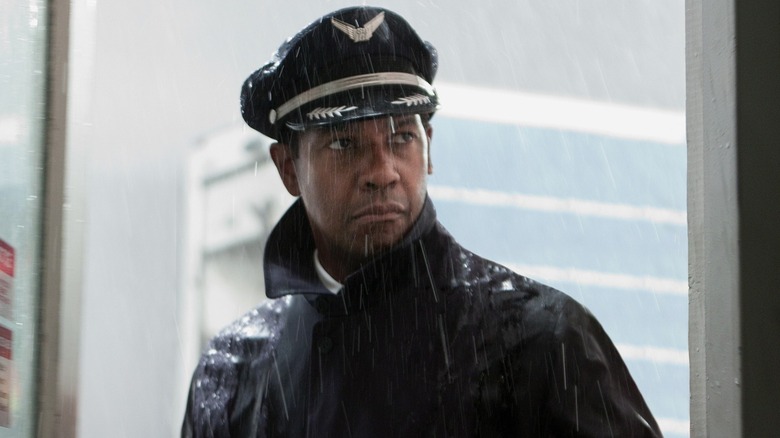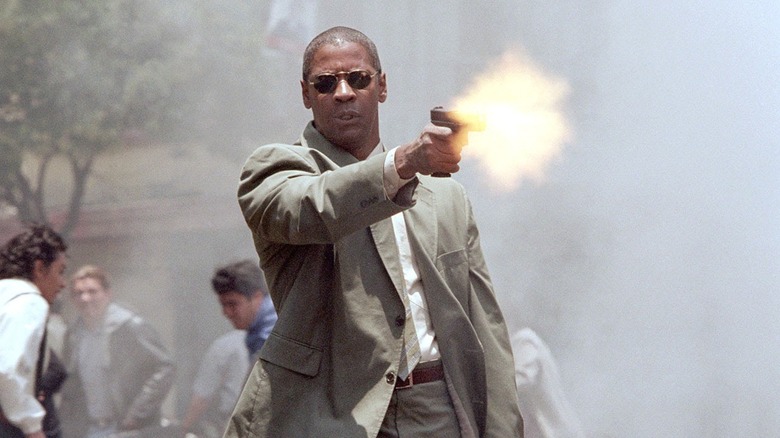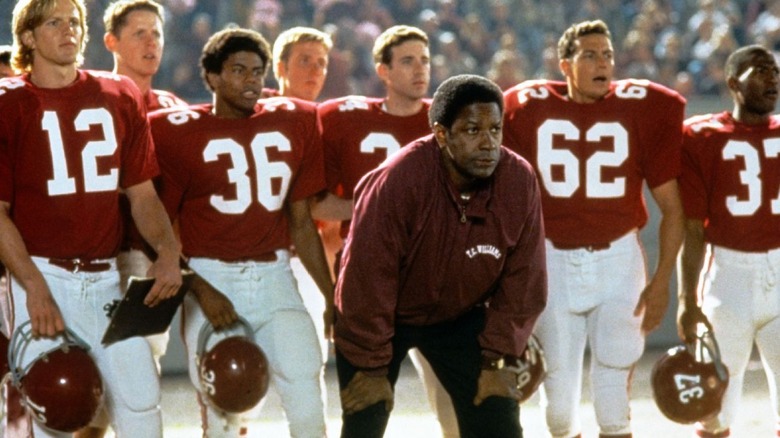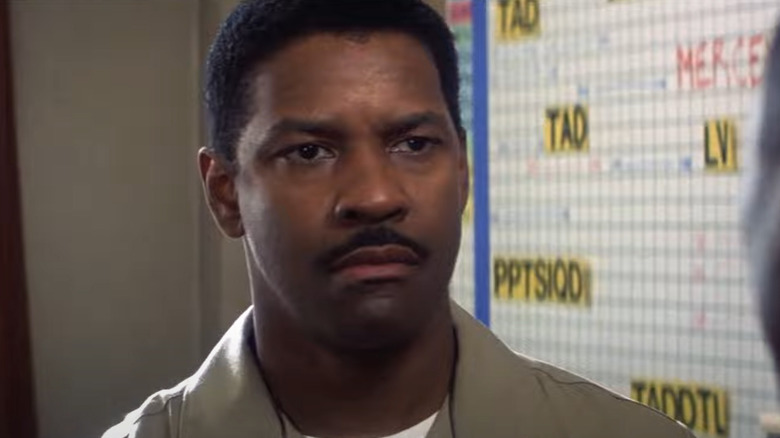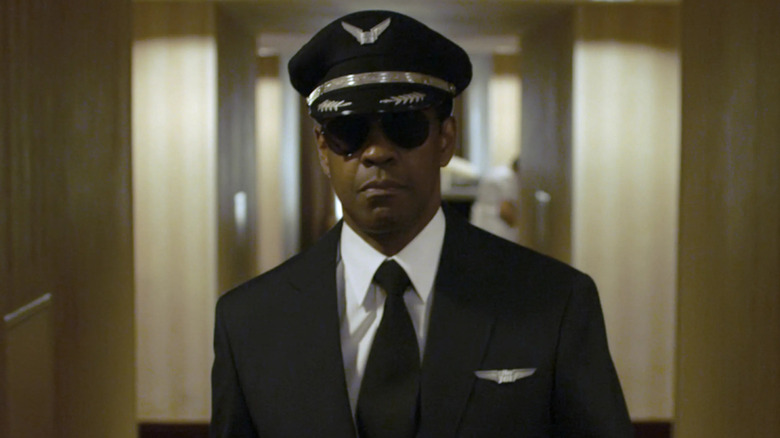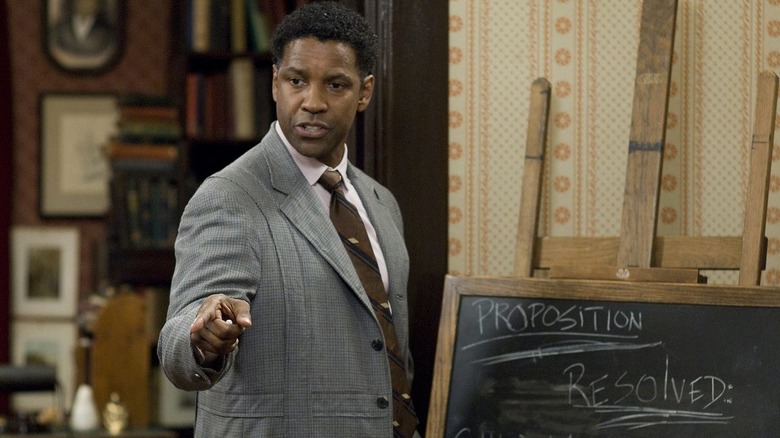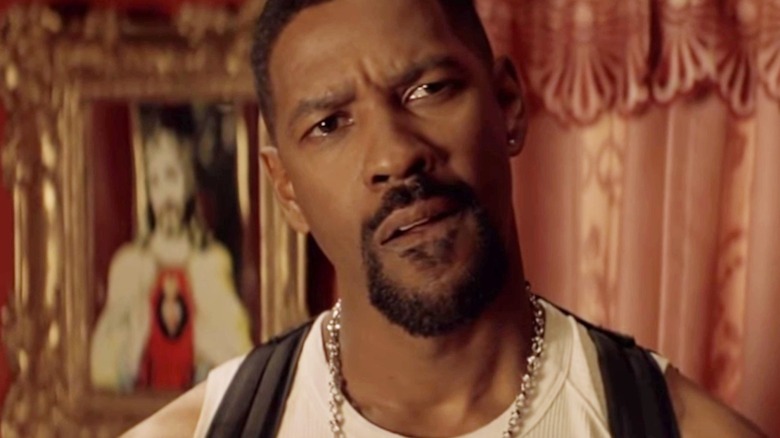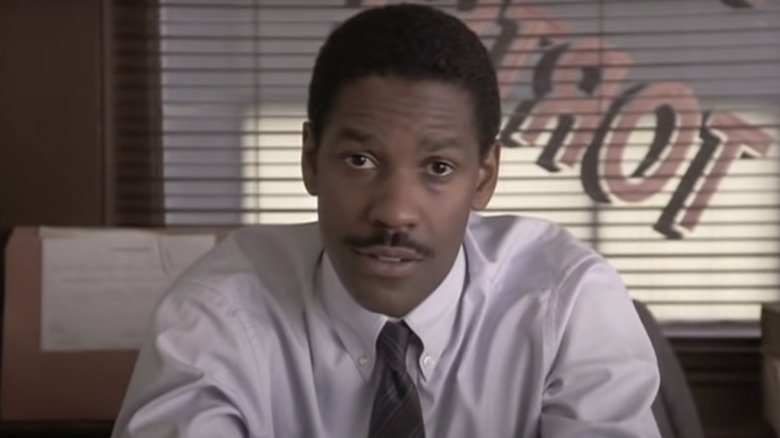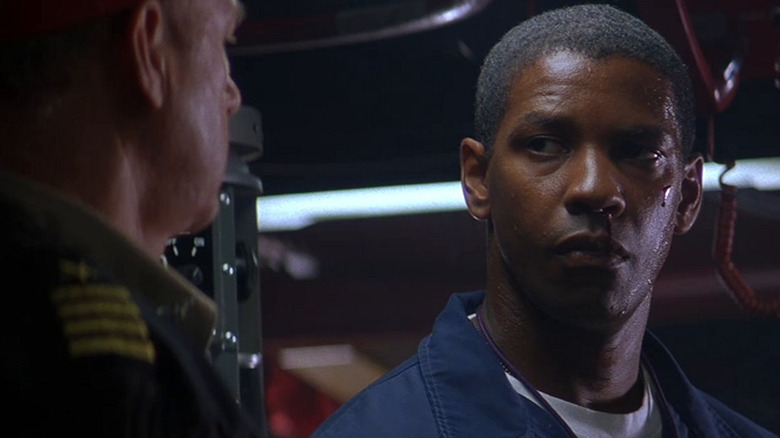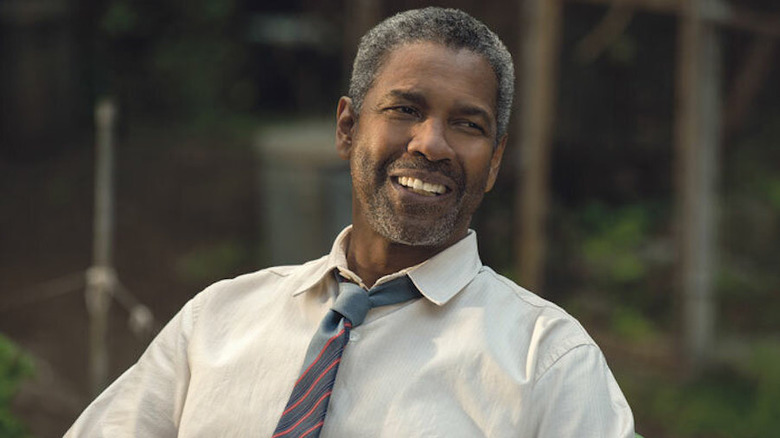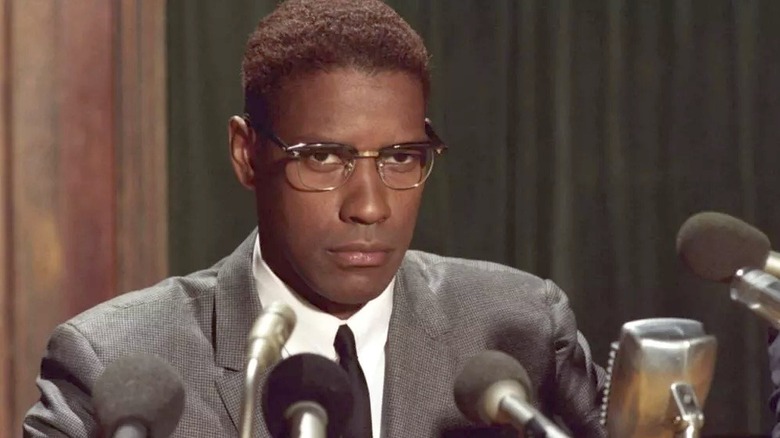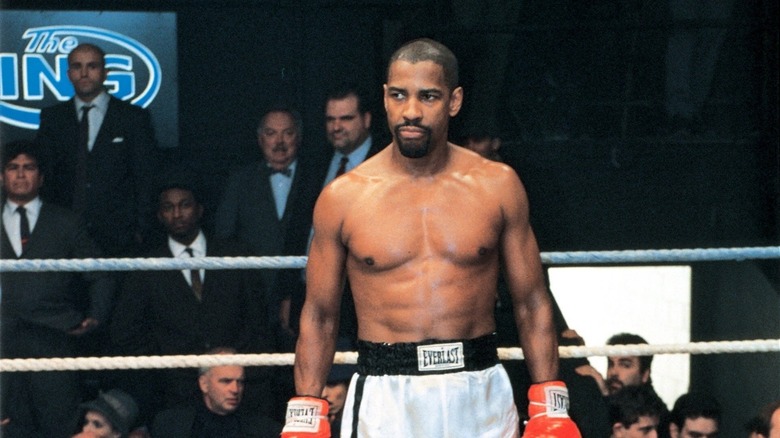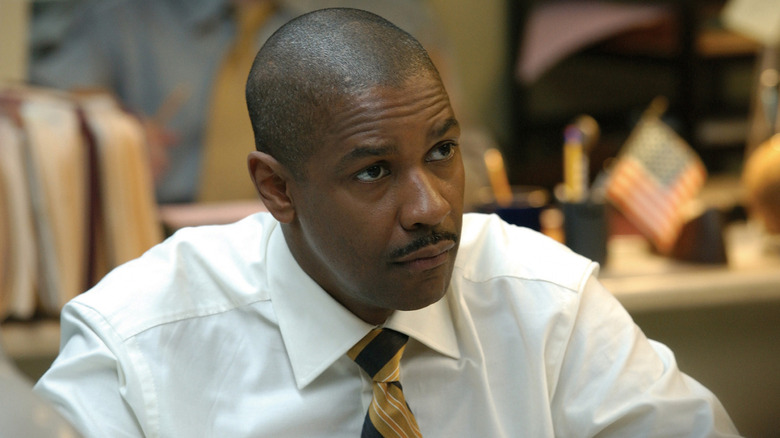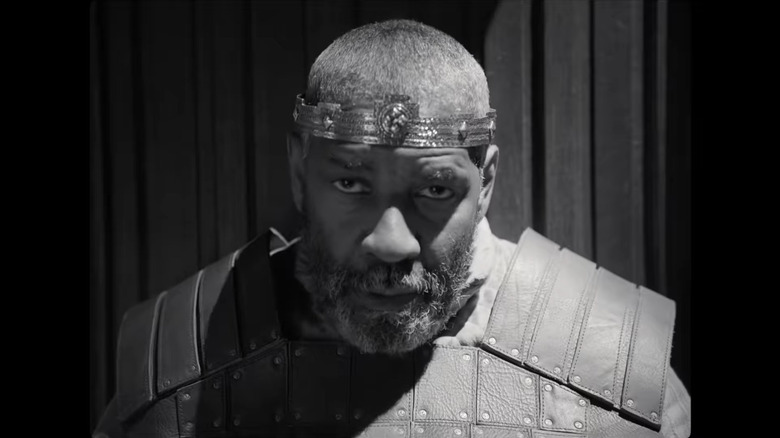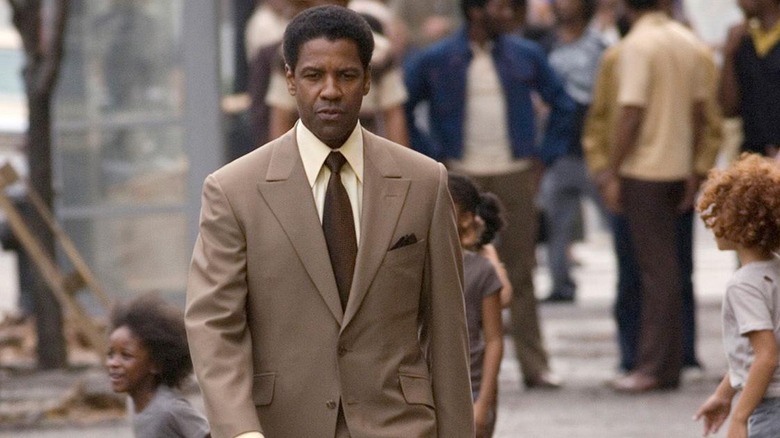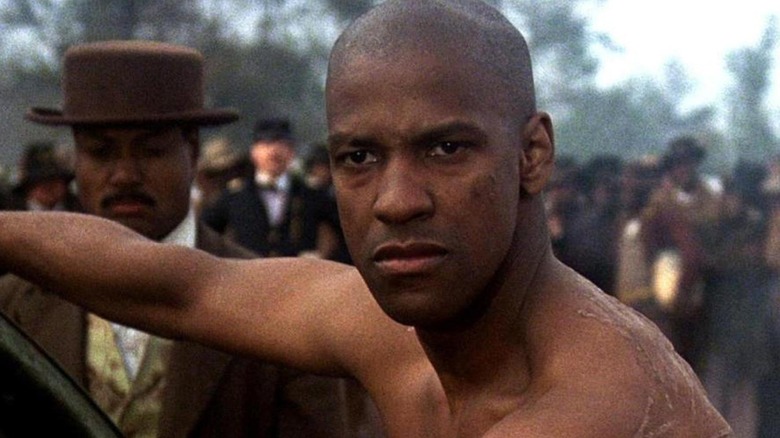The 15 Best Denzel Washington Movies Ranked
Among the greatest actors of the last 40 years, Denzel Washington boasts one of the sturdiest filmographies in Hollywood, with very few duds among them. He's starred in films in just about every genre, too, from gritty crime thrillers and action epics to rom-coms, biopics, and even the odd sci-fi flick. But whether good or bad, one thing you can count on when you lay down your money for a Denzel Washington movie is a powerful performance from its star.
Washington arrived in Hollywood in the '80s, but it wasn't until the next decade when he became a true star. Though his first Oscar nomination came in 1988's "Cry Freedom," it in 1990 that he secured his first of two wins. He's worked with award-winning directors, from Ridley Scott to Spike Lee, and has even helmed some of his own films, too. He's starred alongside Tinesltown's greatest actors as well and has more classics than we can count, including a handful of flops that are still worth watching. But which films in Denzel Washington's filmography are all-time greats? We've found the top 15 and ranked them from worst to best.
15. Man on Fire
Before he led a trilogy of "Equalizer" films — which all narrowly missed this list — Denzel Washington starred in another similar action-thriller in 2004 called "Man on Fire." It was another reunion of sorts for Washington, who worked under his "Crimson Tide" director Tony Scott, the second of four collaborations between them.
In the film, Denzel stars as John W. Creasy, a former CIA agent and US Marine who is at the end of his rope and ready to end it all. But he gets one last chance at redemption when he's hired as a bodyguard for Pita Ramos (Dakota Fanning), the young daughter of a wealthy tycoon (Marc Anthony). When Pita is taken by a mysterious figure known only as La Voz ("The Voice"), Creasy must wage a one-man war on her kidnappers.
An adrenaline-pumping thriller, "Man on Fire" is one of the finest of the genre. It might not have as much beneath the hood as Washington's more serious dramas, but it's a perfectly staged revenge movie and arguably the best pure action movie Washington has ever made.
14. Remember the Titans
The 2000 sports drama "Remember the Titans" is inspired by the real-life story of high school football coach Herman Boone. It stars Denzel Washington as Boone, while Donald Faison, Wood Harris, and a young Ryan Gosling round out the cast of young players.
An underdog story, "Remember the Titans" is set in 1971 at the recently de-segregated T.C. Williams High School in Virginia. There, the controversial decision is made to hire Black coach Herman Boone to lead the team, much to the dismay of the all-white coaching staff. In a region where high school and college football are a way of life, it's up to Boone to rally his forces, soothe racial tensions, and bring everyone together to chase a championship.
A sobering drama about much more than football, "Remember the Titans" remains relevant today, even 25 years later, as we are sadly still grappling with the problem of race and gender in sports. A triumph for Washington — who delivers an inspiring performance as the coach who had to battle racism alongside his teams' opponents — the film is a modern sports classic, even if it didn't tell everything about the true story.
13. Antwone Fisher
Following "Remember the Titans," Denzel Washington decided that acting wasn't enough, and he stepped behind the camera to direct. His first effort in the director's chair was 2002's "Antwone Fisher," another inspirational story that put Washington into the role of mentor. Also based on a true story, "Antwone Fisher" follows a young man from a broken home (Derek Luke) who attempts to escape his troubled life by joining the Navy, where he's finally forced to confront his demons.
Unfortunately, Fisher's upbringing has left him with a violent temper and a short fuse, and he struggles to acclimate to life aboard a ship. Fisher is sent for psychiatric treatment where he meets Dr. Jerome Davenport (Washington), a compassionate fellow officer who sees promise in Fisher and works to help him meet his full potential.
A story of personal struggle and inner courage, "Antwone Fisher" was lauded as a victory for Washington in his directorial debut. He went on to helm several other films, including two more that appear on this list.
12. Flight
In 2012, "Back to the Future" director Robert Zemeckis helmed his first live-action film since 2000's "Castaway" and he couldn't have picked a better star than Denzel Washington to take charge of the picture. He played Captain William "Whip" Whitaker, the pilot of a nearly-doomed flight who is lauded for his courage and heroism after saving the plane in an emergency landing after a catastrophic mechanical failure.
Despite his miraculous landing earning him accolades, though, the subsequent investigation into the crash reveals that Whitaker isn't the perfect pilot everyone believes him to be. Soon, he's facing tough questions about his fitness to sit in the pilot's seat and increased scrutiny from the press and his own family and friends. In the aftermath, Whitaker strikes up an unlikely bond with Nicole (Kelly Reilly), an amateur photographer struggling with drug addiction.
With a modest budget, it was reported that both Zemeckis and Washington took pay cuts to get the movie made. Ultimately, the film was a hit and it was nominated for best original screenplay at the following year's Academy Awards, while Washington earned a nod for best actor.
11. The Great Debaters
In 1997, "American Legacy" magazine published an article about the 1935 Wiley College debate team. In 2007, Denzel Washington made it his sophomore directorial effort, titled "The Great Debaters," also starring in the film as coach Melvin B. Tolson. Jurnee Smollett, Nate Parker, Forest Whitaker, and his son Denzel Whitaker (who was, in fact, named after Washington) rounded out the cast.
With strength and courage, Tolson leads his team of bright young minds at the historically Black Wiley College in the Jim Crow South to greatness, not just in debate but in life as well, as the film explores the deep divides in the era of segregation that forced Black men and women to endure harsh treatment at the hands of a racist system. Perfectly cast, it's still the only film to star the father-son duo of Whitakers. But the real standout is, of course, Denzel Washington, who on top of directing duties delivers yet another powerhouse performance.
10. Training Day
Among the most iconic films of the 2000s, "Training Day" became something a meme before the era of social media thanks a number of iconic moments between the movie's two leads, Denzel Washington and Ethan Hawke. The latter plays Jake Hoyt, an LAPD cop who is up for a promotion. To aid in his ambition, he's partnered with Detective Alonzo Harris (Washington), a tough but respected veteran who's worked on some of the most high-profile drug busts in the city, but is much more than meets the eye.
Taking it upon himself to toughen up the younger officer, Harris puts Hoyt through his paces while working the streets. Harris's tactics cross lines both legally and ethically, but the situation deteriorates when Hoyt learns that his veteran mentor-for-the-day Harris may be working with the Russian mafia — and he might be their next target.
Both Hawke and Washington were nominated for Academy Awards for their roles, with Denzel taking home the award for best actor. Just the third film from up-and-coming director Antoine Fuqua, it was the first of his five collaborations with the Oscar-winning star, with the duo reuniting for "The Magnificent Seven" and three "Equalizer" films.
9. Philadelphia
It might be surprising to learn that 1993's "Philadelphia" was one of the first major movies to center its story on the topic of AIDS. Set in and filmed on location in the city it's named for, "Philadelphia" stars Tom Hanks as Andrew Beckett, a lawyer and closeted gay man who is suffering from advanced symptoms of AIDS when he is dismissed from his law firm. Believing he's been fired because of his condition, Beckett seeks a fellow lawyer to help him fight a wrongful termination suit.
After being turned down by nearly a dozen litigators, Beckett secures the services of Joe Miller (Washington), a Black lawyer who sees parallels between the bigotry Beckett is facing and the racial discrimination he's experienced all his life. Together with Beckett, Miller helps fight for equal rights, even as his client's health begins to dramatically deteriorate.
In a time when AIDS was hardly understood by anyone outside of the medical profession, "Philadelphia" had the courage to examine prejudice faced by the LGBTQ+ community and expose audiences to the realities of the AIDS epidemic. Though Washington didn't receive any Oscar recognition, "Philadelphia" earned Hanks his first Academy Award for best actor.
8. Crimson Tide
By the mid-90s, Denzel Washington had established himself as one of the best dramatic actors working in Hollywood. Mostly known for producing films that ended up as awards contenders, he took a slight turn into the action genre just two years after "Philadelphia." The result was "Crimson Tide," a submarine suspense thriller that saw him sharing the screen with Gene Hackman, Viggo Mortensen, and James Gandolfini.
It's not long after the fall of the Soviet Union when we meet veteran submarine captain Frank Ramsey (Hackman) and his executive officer Lieutenant Commander Ron Hunter (Washington). After a civil war breaks out in Russia, nationalist leader Vladimir Radchenko threatens to start a nuclear war if Western nations attempt to intervene. Now, Ramsey and Hunter are ordered to shadow Russian territory with orders to strike the Eastern power should Radchenko give any signs of making good on his threat.
A tense, nail-biting thriller, the heart of the film is the relationship between Ramsay and Hunter. As the story unfolds, tensions come to a head as the two very different commanders disagree over how to deal with the escalating situation as the prospect of nuclear armageddon looms over them.
7. Fences
Denzel Washington broke away from cinema in 2010 to star in the Broadway revival of August Wilson's "Fences." In the Pulitzer Prize-winning play, Washington and Viola Davis took the stage to play an aging couple, Troy and Rose Lee Maxson, who are raising a teenage son (Jovan Adepo) in the working-class city of Pittsburgh in the 1950s. Troy has lived a difficult life, leaving home to escape an abusive father at 14 and later doing time behind bars on manslaughter charges. Once a man with big dreams, he might have made it to the majors if not for the color barrier in baseball.
Like the original play, the film follows Troy and Rose Lee as they deal with the difficulties of being a Black family in 1950s America. A slice-of-life story, "Fences" was a hit on Broadway, with both Denzel Washington and Viola Davis winning a Tony Award for their roles. For their performances in the film version, Washington was nominated for best actor at the Academy Awards, though it was Davis who ultimately took home the gold statuette.
6. Malcolm X
Particularly in the first decade or so of his career, Denzel Washington seemed to gravitate toward historical dramas and biographical films. Among the best of this batch is the 1992 drama "Malcolm X," a film that put him in the role of one of America's most prominent voices in the Civil Rights Movement. The third of four collaborations with director Spike Lee, "Malcolm X" features a powerhouse cast that includes Angela Bassett, Delroy Lindo, Christopher Plummer, and Giancarlo Esposito.
One of the nation's most divisive civil leaders, Malcolm X had a more militant attitude toward race relations than some of his peers, and he made no apologies for it. He inspired an entire generation exhausted by more passive efforts to achieve equality and used his platform to promote the Nation of Islam, before ultimately being assassinated at the age of 39.
Adapted from a banned book, "The Autobiography of Malcom X," published not long after his death in 1965, the movie adaptation is a tour de force. Denzel Washington is at his very best as he carries the film through his towering performance as the charismatic leader, earning him an Oscar nod.
5. The Hurricane
Boxing dramas have made for some of Hollywood's greatest sports movies, and when Denzel Washington dipped his toe in the genre it didn't disappoint. Released in 1999, "The Hurricane" is yet another biopic for Washington, who donned a pair of big red gloves to play real-life 1970s boxer Rubin "The Hurricane" Carter. Following a troubled upbringing and a stint in the US Army where he was discharged after a court martial, Carter became a successful sportsman, gaining the attention of the boxing world in the early 1960s.
Outside his career in the ring, however, Carter found himself in more trouble. After a fatal robbery attempt on a local restaurant, Carter and a friend were arrested by police because they vaguely matched the description of the suspects. Despite almost no evidence at all, Carter was found guilty of murder and wrongly imprisoned for nearly 20 years.
Beating out the likes of Samuel L. Jackson and Wesley Snipes for the role of Carter, Denzel Washington earned yet another Oscar nomination for his performance in "The Hurricane" while taking home a Golden Globe. It remains one of the best boxing movies of all time, alongside such classics as "Rocky" and "Raging Bull."
4. Inside Man
Since "Mo' Better Blues" in 1990, director Spike Lee has recruited Denzel Washington to be his star three more times, the most recent being 2006's "Inside Man." A riveting crime thriller from first-time screenwriter and lawyer Russell Gewirtz, it was somewhat of a departure for the duo, whose previous collaborations had been more character-driven dramas.
"Inside Man" revolves around a daring bank robbery masterminded by Dalton Russell (Clive Owen), the ringleader of a criminal gang who believe they are committing the perfect heist. Pursuing him is NYPD Detective Keith Frazier (Washington), who is sent in to negotiate the release of hostages. But when the bank's owner (Christopher Plummer) hires a fixer (Jodie Foster) to secure the contents of a mysterious safe deposit box, questions are raised about what the robbers are really after.
A top-notch thriller with clever twists and ratcheting suspense, "Inside Man" didn't win many awards. Despite helming some of the most important and widely-acclaimed films of the '90s, though, "Inside Man" remains Spike Lee's highest-grossing film, and it got a direct-to-video sequel that you may have missed. Lee and Washington, meanwhile, are slated to reunite in 2025 for a remake of the Akira Kurosowa film "High and Low."
3. The Tragedy of Macbeth
The iconic directing duo of Joel and Ethan Coen split up in the late 2010s, reportedly because Ethan was calling it quits in Hollywood (spoiler: he came back). Brother Joel's first solo directing gig after the breakup was a modern retelling of the Shakespeare classic, "The Tragedy of Macbeth." Coen wrote and directed the picture, casting Denzel Washington in the title role, with Coen's former "Blood Simple" and "Fargo" star Frances McDormand playing Lady Macbeth.
Joining Washington and McDormand are a cavalcade of character actors including Brendan Gleeson, Henry Melling, and Stephen Root. It was an unexpected turn for Denzel Washington, but it proved to be one of the best films in his storied career, a victory for Coen, and a major awards contender. But while some modern reinterpretations of Shakespeare succeed by bringing a new take on the material, Coen opts for a more faithful approach. Ultimately, it's the film's luscious visuals and striking direction that carry the load, while Washington's dominant performance as Shakespeare's most iconic king earned him his 10th Oscar nomination.
2. American Gangster
His first film with director Ridley Scott, "American Gangster" is a 2006 crime thriller inspired by the true story of Harlem drug kingpin Frank Lucas. Infamous in New York City in the 1970s, Lucas was eventually busted for drug trafficking, avoiding a 70-year sentence by agreeing to become an informant. He later developed an unlikely friendship with the detective who arrested him, even hiring him as his own attorney later in life.
A fictionalized version of the true story, "American Gangster" boasts an all-star cast led by Denzel Washington, Russell Crowe, Chiwetel Ejiofor, and Josh Brolin. Washington plays Lucas himself, while Crowe slaps on a badge as Detective Richie Roberts, the NYPD cop who is tasked with taking Lucas down.
Praised for recapturing the noir-ish spirit of classic gangster movies, "American Gangster" is a hard-boiled crime story of old. Engrossing and suspenseful, the story is elevated by its stellar cast, who are all at the top of their game.
1. Glory
It should come as no surprise that Denzel Washinton's best film is a biographical historical epic: 1989's Civil War classic "Glory." Based on accounts written by officer Robert Shaw, the film is inspired by the true story of an all-Black U.S. Army regiment. Shaw is played by Matthew Broderick, who has been recently promoted to take command of the 54th Massachusetts Infantry. The unit is made up of Black former slaves, some recently freed and others who had escaped from the Southern states.
In addition to Broderick and Washington, "Glory" is led by a standout performance from Morgan Freeman as Sergeant Major John Rawlins, and the late Andre Braugher as Corporal Thomas Searles. A rare glimpse at a piece of overlooked history, "Glory" illuminates the forgotten but historic sacrifices made by the first Black regiment to ever fight in an American war, as they faced more than just the enemy, but prejudice and disdain from people purportedly on their side.
Expertly directed, finely cast, and providing a gritty look at the reality of the nation's bloodiest conflict, "Glory" ranks among the best Civil War movies ever made.
